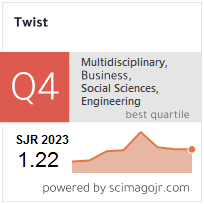Consumer Attitude towards Green Products: Evidences from Nagaland, India
Keywords:
Green marketing, Green consumers, Theory of Planned BehaviourAbstract
Environmental issues are becoming increasingly popular as people and governments worldwide grow more conscious of them. Green marketing emerged as a result, and businesses now employ it as one of their profit-making and environmental-protection strategies. The late 1980s and early 1990s saw a gradual rise in the use of green marketing. Green eco-friendly items are now the focus for both consumers and manufacturers, leading to product innovation. When making purchases, green consumers, also called eco-conscious or sustainable consumers, prefer goods and services that are sustainable and favourable to the environment. Today's media and social movements are also raising consumer awareness of the potential environmental effects of products. Marketers have embraced the idea of green marketing in order to thrive in the face of these societal shifts. This study aims to investigate how green marketing affects consumers' attitudes and buying behaviour. The study was conducted in Nagaland using a structured questionnaire based on the Theory of Planned Behaviour (TPB), and the data was analysed using Exploratory Factor Analysis (EFA). The EFA identified three constructs of consumers’ attitudes toward green marketing and eco-friendly products, viz. “Environmental Concerns and Green Products”, “Customer Trust”, and “Purchase Intention”. The survey revealed that Nagaland consumers have a positive outlook on eco-friendly and green products. Consumer behaviour toward purchasing green eco-friendly products are unaffected by demographic factors.
Downloads
Downloads
Published
Issue
Section
License
Copyright (c) 2023 TWIST

This work is licensed under a Creative Commons Attribution-NonCommercial-ShareAlike 4.0 International License.











